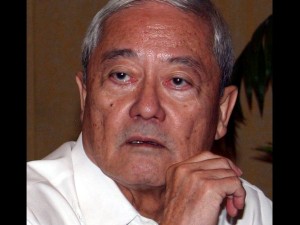Appeals court denies Ongpin appeal on Philex short-swing profit case
MANILA, Philippines—The Court of Appeals has ordered the Pasig City Regional Trial Court to proceed with the hearing of the derivative suit seeking to compel businessman and former Trade Minister Roberto Ongpin to return P412 million in “short swing profits” he had allegedly earned from the sale of shares of Philex Mining Corp.
A derivative suit is lawsuit brought by a shareholder of a corporation on its behalf to enforce or defend a legal right or claim, which the corporation has failed to do.
The complainants, including Mario Ongkiko, a stockholder of Philex, alleged that under Section 23.2 of the Securities Regulation Code, an incumbent company insider like a director or officer is barred from profiting from trading in the same shares within a period of six months.
The short-swing profits of P412.5 million stemmed from Ongpin’s purchase of 50 million Philex shares from the Development Bank of the Philippines (DBP) at P12.75 per share on Nov. 5, 2009, and selling the very same shares to Two Rivers Pacific Holdings Corp. of Manuel V. Pangilinan, Philex chairman, on Dec. 7, 2009, at P21 per share.
The complaint also asked the court to direct Ongpin and his firms—Deltaventure Resources, Inc. and Goldenmedia Corporation—to return to Philex other short-swing profits, if any.
In her resolution, Pasig City Regional Trial Court Branch 158 Judge Maria Rowena Modesto San Pedro said that following the existing jurisprudence, it is better that the correct amount of fees amounting to more than P8.2-million be considered a “lien on the judgment to be rendered than to straightjacket minority shareholders from seeking corporate best practices.”
Ongpin took the case to the Court of Appeals, which said that the lower court had no jurisdiction over the complaint due to the refusal of the complainants to pay the correct filing fees, among other reasons.
He further stated that since the complaint failed to include the amount of damages demanded that resulted in the computation and payment of an incorrect filing fee, the trial court had lost jurisdiction over the case.
But the appellate court third division, through Associate Justice Apolinario Bruselas Jr., said “the non-specification of the amounts of damages does not immediately divest the trial court of its jurisdiction over the case, provided there is no bad faith or intent to defraud the government on the part of the plaintiff.”
It further stated that the Pasig court did not commit grave abuse of discretion in dismissing Ongpin’s motion to expunge the complaint on grounds that the complainant lawyer Mario Ongkiko, stockholder of Philex, failed to pay the corresponding filing fees.
The lower court, in dismissing Ongpin’s motion, said that a motion to expunge is like a motion to dismiss, which is prohibited under the Interim Rules on Intra-Corporate Controversies.
“Thus, although the petitioners’ motion to expunge complaint is not among the prohibited pleadings listed in the Interim Rules on Intra-Corporate Controversies, its being uncannily similar in effect to a motion to dismiss, which is absolutely prohibited under the interim rules, makes it the ‘same dog with a different collar,’ so to speak,” the appeals court said.
“No grave abuse of discretion may be attributed to the RTC in disallowing such cleverly titled motion given the factual and legal milieu upon which the resolution was rendered,” it added.
Concurring with the ruling were Associate Justices Rebecca de Guia-Salvador and Samuel H. Gaerlan.
